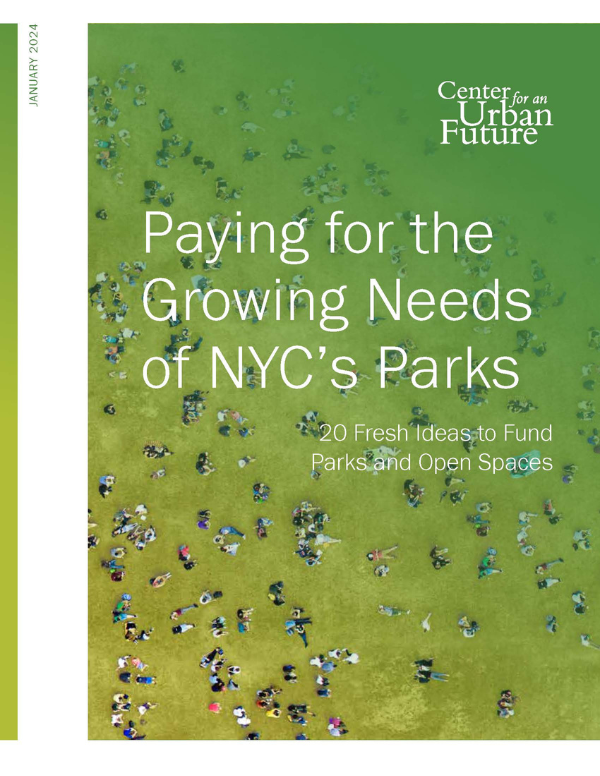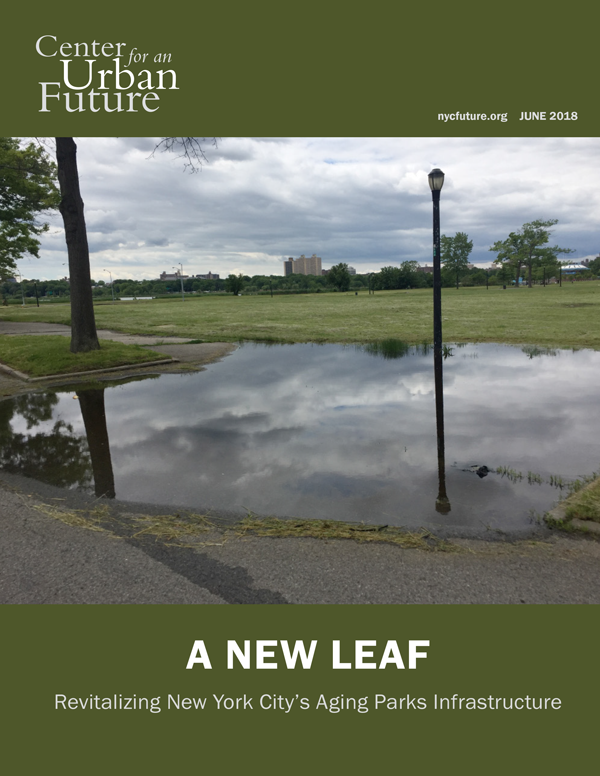"Paying for Parks: Generating New Revenues to Support NYC’s Parks and Open Spaces"
A Center for an Urban Future Policy Symposium
Replay of the event
Event Materials
New York’s parks, playgrounds, and open spaces have experienced record usage in recent years and have become even more vital to the health of New Yorkers and more critical to the city’s economic future. But for years if not decades, New York City has struggled to provide sufficient funding for its parks. Addressing this chronic funding shortfall, even as the city faces steep budget deficits, will require new dedicated revenue streams for the city’s parks. CUF's Februrary 7th forum, Paying for the Growing Needs of NYC’s Parks, discussed many of the 20 revenue ideas put forward in CUF's recent and explored other steps city policymakers can take to expand and strengthen New York’s green spaces.
Check out the video of our forum, which featured NYC Deputy Mayor for Operations Meera Joshi, NYC Parks Commissioner Sue Donoghue, New York City Council Parks Committee Chair Shekar Krishnan, New Yorkers for Parks Executive Director Adam Ganser, City Parks Foundation Executive Director Heather Lubov, Prospect Park Alliance President Morgan Monaco, Carter Ledyard & Milburn Partner Christopher Rizzo, and New York League of Conservation Voters President Julie Tighe.
There was support for many of the ideas CUF advanced for generating new revenues for parks, but a few things from the discussion stood out:
- City leaders should add a $1 surcharge on tickets sold at stadiums located on parkland, like Citi Field, Yankee Stadium, and the USTA Tennis Center, with proceeds funding parks maintenance and programming citywide.
- A modest expansion of concessions in parks could generate new funding for parks while enhancing the experience of parkgoers. There are surprisingly few restaurants, cafes, and other concessions in parks across the city. Where they do exist, they invariably make the parks even more appealing.
- New York should leverage real estate for the benefit of parks, whether through the creation of Parks Improvement Districts, tax increment financing, or transfer of development rights.
- City lawyers should make easier for local nonprofits—including “Friends of” groups, conservancies, and alliances—to hold fundraising events that bring in alternative revenue streams to supplement the maintenance and operations of individual parks. As Christopher Rizzo noted during our panel, the city has too often thrown up unnecessary roadblocks when negotiating licensing agreements with these groups: “[City officials] often expect [these groups] to take over all of the operations or maintenance of a park, when they are really just ready to take on bits and pieces. Sometimes the insurance requirements or indemnification requirements are too onerous for a group that’s just starting. The Parks commissioner or mayor can always terminate [these licensing agreements] at any time if they are not working out, so the risks are low but the benefits for parks could be really huge by allowing groups to bring in alternative revenues into parks to supplement the maintenance of them.”
- It’s time to let the city’s parks department hold onto the revenue generated in parks. Today, the lion’s share of money from concessions in parks goes to the city’s general fund. NYC is one of only a few parks systems in the country where this is the case.
- It’s critical to establish a mechanism to ensure that new revenues benefit parks in every corner of the city, not just those with new revenue-generating opportunities. We suggest an 80-20 split for all future revenue from new parks concessions, with 80% remaining with the park hosting the new concession and 20% allocated to a fund to support parks in lower-income communities.
- We need to develop alternative revenue streams to support NYC’s parks, but that shouldn’t preclude the Mayor and City Council from boosting city operating support for parks. Parks are more important than ever, but for years NYC has failed to provide sufficient funding for its parks.
A video of the full discussion is available here.
This symposium was made possible through generous support from City Parks Foundation's NYC Green Fund and the Lily Auchincloss Foundation. We are also grateful for general support from The Clark Foundation, the Altman Foundation, and ongoing support from a number of other philanthropic funders.




